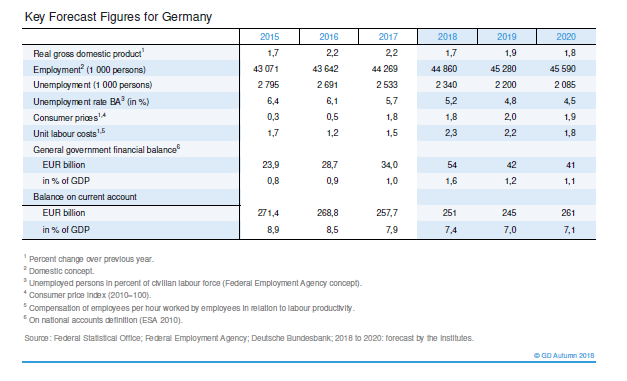Joint Economic Forecast for Germany: Upturn Loses Momentum
Germany’s leading economics research institutes and their international partners have downwardly revised their forecasts for 2018 and 2019. They now expect economic output to increase by 1.7 percent in 2018, and not 2.2 percent as forecast in spring. They also scaled back their 2019 forecast slightly from 2.0 to 1.9 percent. These are the results of the Joint Economic Forecast for autumn 2018 that will be presented in Berlin on Thursday.
“The upturn in the German economy is losing momentum. Demand from abroad has weakened, and companies are apparently suffering from labour shortages in production too,” explains Roland Döhrn, Head of Economic Forecasting at RWI – Leibniz Institute for Economic Research, which coordinated this autumn’s report. Commenting on the German government’s economic policy, he added: “Short-term initia-tives like the family home-owner allowance tend to lead to windfall effects and rising costs because capacity utilisation in the construc-tion industry is already high. In the current economic climate we need a housing policy that is geared more towards continuity.”
The number of persons in employment will rise from 44.9 million this year to 45.3 million next year and 45.6 million in 2020. At the same time, the number of registered unemployed persons will decline from 2.3 million this year to 2.2 million in 2019 and 2.1 million in 2020.
This will bring the unemployment rate down from 5.2 percent this year to 4.8 percent in 2019 and 4.5 percent in 2020. Inflation in consumer prices will rise from an average of 1.8 percent this year to 2 percent in 2019, before dipping back down to 1.9 percent in 2020. Pressure from domestic prices will increase.
The institutes expect significant fiscal surpluses over the entire forecasting hori-zon. The surplus will hit a new record high of 54 billion euros this year. By 2020 the fiscal balance will melt down to 41 billion euros due to the government’s expansionary fiscal policy stance.
The risks for the German and international economic have grown since spring. At a global level this is mainly due to the rising number of trade conflicts, while the main risks at a European level are the possibility of Britain’s disorderly exit from the EU and the potential outbreak of a debt crisis in Italy.

The Joint Economic Forecast is prepared by the DIW (Berlin) in cooperation with the Austrian Institute of Economic Research (WIFO), the ifo Institute (Munich) in cooperation with the KOF Swiss Economic Institute – ETH Zurich, the IfW (Kiel), the IWH (Halle) and the RWI (Essen) in cooperation with the Institute for Advanced Studies in Vie
Kontakt
KOF Konjunkturforschungsstelle
Leonhardstrasse 21
8092
Zürich
Switzerland
KOF Konjunkturforschungsstelle
Leonhardstrasse 21
8092
Zürich
Switzerland